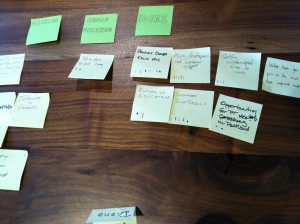Topics that made the cut
- Product Owner Faux Pas
- Product Owner, the most reviled role in Scrum
- Part of the problem is that the PO role was designed by people who did not perform the role
- At what point does an on-site customer lose their relevance?
- Sometimes an organization fails to make PO duties a priority
- Mixing development and customer support
- New Relic teams rotate “PS hero” duty. Incorporate it into planning. While on hero duty, the hero’s primary responsibility is to resolve PS work that is escalated.
- Dev teams need to see PS problems and deal with them in order to learn more about their product, their customers, etc.
- Software “Soft” Skills
- How do devs develop soft skills, such as
- Looking to see if the problem they are facing has already been solved
- Talking about software or development in non-technical language
- Working in a team environment
- Listening skills drive soft skill development
- Would like to see academia teach team skills and TDD. Curriculums provide a major impediment to seeing this widely adopted in college/university.
- So you’re a shy introvert who needs to learn to listen. Try staring at their shoes.
- How do devs develop soft skills, such as
- Future of Education
- How does self education fit into job prep?
- How are sites like coursera, Kahn academy, etc changing education?
- Some employers are dropping degree requirements
- Getting uninterrupted time to work
- Most importantly, when you interact with people, you are training them on how to treat you. If you are responsive to interruption, you are training people to interrupt you.
- Pomodoro Technique (http://en.wikipedia.org/wiki/Pomodoro_Technique) can be used to set boundries. Teach people to look at the timer and come back when you are done.
- Pairing can be used to focus people and scare off interrupters, especially if you pair with someone who intimidates people.
- Often, if you ask someone to wait even ten minutes, they won’t need work from you later
- Opportunities for Part Time Coaching/Mentoring in Portland
- What have you put on the wall that improved work?
- Saved the world today counter to recognize individuals who respond to unforeseen problems
- Rumor Control Board. The work environment was suffering from too many rumors. The Rumor Control Board was for posting rumors and official information and responses to them. A very significant benefit was that placing a rumor on the RCB labeled it as a “rumor” and lead people to take it less seriously.
- Big Visible displays have a half-life. After a while, they lose their effectiveness or relevance and need to be reconsidered, less they become waste.
- Tell us about Product Camp
- Disappointment with the structure.
- Sessions were centered around presenters wanting to share a specific topic. (As opposed to facilitators who want to learn about a specific topic)
- Participants reacted negatively to people choosing to leave a session
- Some participants had seen an anti-product owner bias from developers at Agile Open Northwest. At Product Camp, they saw an anti-developer bias. “Well, we just have to fix the engineers.” Perhaps we shouldn’t solve our problems by getting someone else to change.
- Disappointment with the structure.

